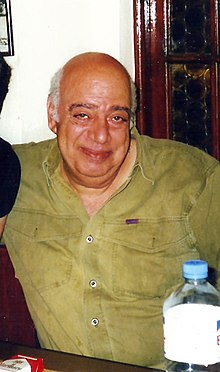Ali Salem (original) (raw)
From Wikipedia, the free encyclopedia
Egyptian playwright and author
This article is about the Egyptian writer. For the archer, see Ali Ahmed (archer).
| Ali Salem | |
|---|---|
 A meeting in Cairo between Salem and representative of Mothers and Women for Peace from Israel, 1998 A meeting in Cairo between Salem and representative of Mothers and Women for Peace from Israel, 1998 |
|
| Born | (1936-02-24)24 February 1936Damietta, Egypt |
| Died | 22 September 2015(2015-09-22) (aged 79)Mohandessin, Egypt |
| Nationality | Egyptian |
| Occupation | playwright |
| Awards | Civil Courage Prize (2008) |
Ali Salem, also transliterated Ali Salim (Arabic: على سالم, IPA: [ˈʕæli ˈsæːlem]; 24 February 1936 – 22 September 2015), was an Egyptian playwright[1] known for controversially endorsing cooperation with Israel.[2] The Los Angeles Times once described him as "a big, loud man known for his satiric wit".[2]
From the premiere of his first play in 1965, he wrote 25 plays and fifteen books.[3] One of the best known, The School of Troublemakers, debuted in 1971 and featured a rowdy class of children transformed by a kind teacher.[2] His plays The Phantom of Heliopolis, The Comedy of Oedipus, The Man Who Fooled the Angels, and The Buffet have also become "classics of the Egyptian theater".[3] Salem's plays often include allegorical critiques of Egyptian politics with a strong vein of humor and satire.[3]
In 1994, he wrote a book entitled My Drive to Israel about a trip he took to the country to satisfy his curiosity about it following the signing of the Oslo Accords.[4][5] He later claimed that the trip was not "a love trip, but a serious attempt to get rid of hate. Hatred prevents us from knowing reality as it is".[2] He spent 23 nights in Israel and concluded that "real co-operation" between the two nations should be possible.[4] Though the book sold more than 60,000 copies, a bestseller by Egyptian standards, it provoked controversy, and Salem was subsequently ostracized from the Egyptian intellectual community and expelled from its Writer's Syndicate as a result of his "propaganda."[2] He did not have a play or movie script produced in Egypt after the book's publication,[4][6] though he continued to contribute columns to foreign media such as the London-based Al Hayat.[2] Salem's memoir was later adapted by Ari Roth into the play Ali Salem Drives to Israel, which had its world premiere in the US in 2005.[7][8]
In 2008, he won the Train Foundation's $50,000 Civil Courage Prize in recognition of his opposition to Islamic extremism and his support of cooperation with Israel.[6] He also received an honorary doctorate from Israel's Ben-Gurion University of the Negev in 2005.[3] He died in Cairo on 22 September 2015 after a long illness.[5][9]
- ^ Michael Slackman (9 March 2005). "Egypt's Metamorphosis: One Step Down the Open Road". The New York Times. Retrieved 28 May 2011.
- ^ a b c d e f Nadia Abou El-Magd (10 November 2002). "Egyptian Writer Pays High Price for Visit to Israel". Los Angeles Times. Retrieved 28 May 2011.
- ^ a b c d "2008 Civil Courage Prize Honoree: Ali Salem of Egypt". Civil Courage Prize. 2008. Archived from the original on 25 July 2011. Retrieved 28 May 2011.
- ^ a b c Christian Fraser (12 October 2009). "Egyptians nervous of Israeli culture". BBC News. Retrieved 28 May 2011.
- ^ a b "Ali Salem's Journey". The New Yorker. 2015-09-28. Retrieved 2016-10-06.
- ^ a b "Egypt author Ali Salem receives courage award". Reuters. 18 November 2008. Retrieved 28 May 2011.
- ^ Barry Barriere (21 January 2005). "Forecast: Fun". The Washington Post. Retrieved 28 May 2011.
- ^ "Association for Jewish Theatre members announce 2004-05 Season". jewish-theatre.com. Archived from the original on 2013-04-20. Retrieved 28 May 2011.
- ^ "Famous playwright Ali Salem dies at 79 - Egypt Independent". egyptindependent.com. Retrieved 23 September 2015.
- Hugi, Jacky. "Death of Egyptian author who drove across Israel leaves void in Israeli-Egyptian relations", Al-Monitor on-line magazine; 30 Sept. 2015.
- Mikics, David. "The Muslim World's Intellectual Refuseniks Offer Enlightened Views on Islam and Israel", TabletMag.com on-line magazine; 3 Dec. 2013.
- Citation for the Civil Courage Prize Archived 2011-07-25 at the Wayback Machine
- "Egyptian Playwright Ali Salem, 1936-2015 – In Memoriam". MEMRI. September 24, 2015